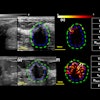False-positive findings on screening mammography cause mental anguish in women that can linger for years after the findings are first reported, according to a new study published in the Annals of Family Medicine.
The study is the latest salvo in the debate on the benefits of screening mammography, with one side arguing that the technology's benefits outweigh its harms because it has saved thousands of lives, while the other argues that its harms can be significant.
"Having a false positive is not harmless and causes undesirable outcomes in the long run," wrote researchers from the University of Copenhagen in Denmark.
For the study, Dr. John Brodersen, PhD, and colleague Volkert Dirk Siersma, PhD, included 454 women with abnormal mammography findings over a one-year period. For each woman with an abnormal finding (false and true positives), the team recruited another two women with normal results who were screened the same day at the same clinic.
Brodersen and Siersma then asked each of these women to complete a questionnaire that covered 12 psychosocial outcomes -- i.e., the interaction of social and psychological effects -- at the baseline exam and then at one, six, 18, and 36 months (Ann Fam Med, March/April 2013, Vol. 11: 2, pp. 106-115).
The team found that six months after final diagnosis, women with false-positive findings reported negative changes in "existential values" and inner calmness that were as great as those reported by women with a diagnosis of breast cancer. Three years after being declared free of cancer, women with false-positive results consistently reported greater negative psychosocial consequences, compared with women who had normal findings in all psychosocial outcomes covered by the questionnaire.
In a joint statement, the American College of Radiology (ACR) and the Society of Breast Imaging (SBI) responded swiftly to the research. Conceding that anxiety about inconclusive test results is real, the two organizations stressed that the benefits of breast cancer screening far outweigh the harms.
"There are too many methodological questions and irregularities regarding this analysis to accept the authors' conclusion that anxiety is worse or more prolonged than previous studies concluded," ACR and SBI said in a statement.




















